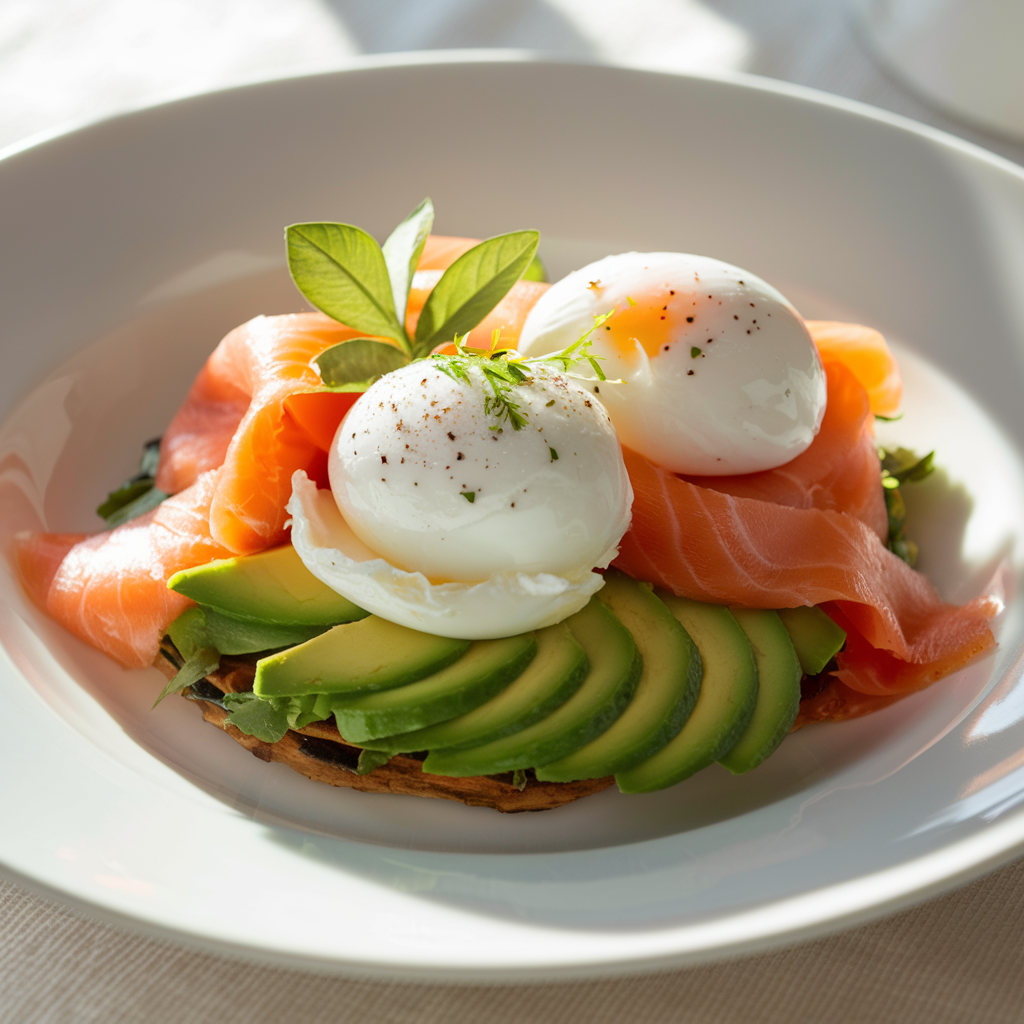
Breakfast is the most important meal of the day. It sets the tone for your energy, focus, and overall health. While eggs, toast, and cereal are common choices, there’s a new trend you should try—eating fish for breakfast. Fish has been a breakfast staple in many cultures for centuries. For example, smoked salmon bagels are popular in the United States, while kedgeree is a comforting dish in Britain. Fish is both versatile and packed with nutrients.
Why Fish for Breakfast?
Eating fish for breakfast isn’t just about variety. It’s a smart choice for your health. Fish is rich in omega-3 fatty acids, protein, and essential vitamins. These nutrients support brain health, improve heart function, and boost your energy. Additionally, fish fits well with popular diets like keto and pescatarian plans. As more people focus on sustainable and healthy eating, fish has become a top pick for starting the day.
Overview of This Article
This guide will explore everything you need to know about fish for breakfast. We’ll cover its health benefits, share simple recipes, and offer tips for picking the best fish. You’ll also learn how to overcome common concerns, like reducing fishy smells or finding allergy-friendly options. By the end, you’ll feel inspired to make fish a delicious part of your morning routine.
Table of Contents
The Benefits of Eating Fish for Breakfast
Fish is a nutritional powerhouse, and including it in your breakfast can transform your health and energy levels. Let’s explore why fish for breakfast is an excellent choice, highlighting the specific benefits it offers for your body and mind.
Nutritional Value of Fish
Fish is one of the most nutrient-dense foods you can eat. It is packed with high-quality protein, essential vitamins, and minerals that fuel your body. For instance, fish contains vitamins D and B12, which support your bones and nervous system. Additionally, fish like salmon, mackerel, and sardines are rich in omega-3 fatty acids. These fats are crucial for brain health, heart function, and reducing inflammation.
Starting your day with fish means you’re giving your body a solid foundation of nutrients. Unlike sugary cereals or pastries, fish keeps you full and energized for longer. The protein in fish slows digestion, preventing mid-morning energy crashes. This makes it a better breakfast option for busy people who need to stay focused.
Rich in Omega-3 Fatty Acids
Omega-3 fatty acids are often called “healthy fats,” and for good reason. They help reduce the risk of heart disease, lower blood pressure, and improve cholesterol levels. For your brain, omega-3s are a game-changer. Studies show they enhance memory, concentration, and mood. Eating fish in the morning gives your brain a head start, helping you stay sharp throughout the day.
Certain fish, such as salmon and trout, are especially rich in omega-3s. Even a small portion in the morning can meet a large part of your daily requirement. Pairing these fatty fish with whole-grain toast or eggs adds even more nutrients to your meal.
Boosting Morning Energy Levels
Starting the day with fish provides long-lasting energy. Fish is a lean protein that supports muscle repair and growth. When combined with healthy fats and low carbohydrates, it fuels your body without the sugar highs and crashes caused by typical breakfast options.
For example, a breakfast of smoked salmon on avocado toast provides the right mix of protein, fat, and fiber. This combination keeps your energy steady and your hunger satisfied for hours. Adding fish to your breakfast is also a great way to start a fitness routine, as the protein helps build and repair muscles.
Why Fish Is Better Than Processed Breakfasts
Many traditional breakfasts, like pancakes and sugary cereals, are high in carbohydrates but low in nutrients. These foods can lead to quick energy spikes followed by a crash. In contrast, fish offers a balanced blend of protein, fats, and vitamins that sustain you throughout the morning.
Processed breakfasts are often loaded with preservatives and additives, which can harm your health over time. Fish, on the other hand, is a natural, whole-food option. Fresh fish, when cooked simply, has fewer calories and more nutrients than most packaged breakfast items.
Popular Breakfast Recipes with Fish

Fish for breakfast doesn’t have to be complicated. In fact, it can be as simple or elaborate as you want. From quick dishes to cultural classics, there are countless ways to include fish in your morning meal. Here are some of the most delicious and easy-to-prepare options.
Quick and Easy Recipes
For busy mornings, quick fish-based breakfasts are a lifesaver. Not only are these recipes simple, but they also provide a nutritious start to your day.
- Smoked Salmon and Cream Cheese Toast
- First, spread cream cheese on a slice of whole-grain bread.
- Next, layer smoked salmon on top and garnish with capers, red onions, and a squeeze of lemon.
- Mackerel Frittata
- Begin by whisking eggs with salt, pepper, and a splash of milk.
- Then, add flaked canned mackerel, spinach, and diced tomatoes.
- Pour the mixture into a greased pan and cook on low heat until set.
- Sardine Breakfast Bowl
- Start by combining cooked quinoa, a chopped boiled egg, and a can of sardines.
- After that, top with avocado slices and a drizzle of olive oil for extra flavor.
These quick recipes are not only high in protein but also perfect for those mornings when time is short.
Traditional Fish Breakfast Dishes Around the World
Fish for breakfast is not just a modern trend. In many cultures, it has been a staple for centuries. For instance, in the United Kingdom, kedgeree is a popular dish. This hearty mix of flaked fish, rice, boiled eggs, and spices like turmeric and cumin is a favorite for many families.
Meanwhile, in the United States, bagels with lox are a classic choice. Smoked salmon, cream cheese, capers, and fresh bagels create a timeless breakfast combination.
In Japan, grilled fish is often served as part of a traditional morning spread. Typically, it comes with rice, miso soup, and pickled vegetables for a balanced meal. Similarly, Nordic countries enjoy smørrebrød, an open-faced rye bread sandwich topped with pickled herring or smoked trout.
These dishes highlight the versatility of fish and how it can be paired with other healthy ingredients for a satisfying breakfast.
Pairing Fish with Other Breakfast Foods

One of the best things about fish is that it pairs wonderfully with many breakfast staples. For example, it goes perfectly with eggs. You can combine poached eggs with smoked salmon for a protein-packed meal or create an omelet filled with trout or crab meat for extra flavor.
Additionally, fish works well with avocado, a breakfast favorite. By adding grilled fish fillets to avocado toast, you create a nutrient-dense option that’s both filling and delicious.
Furthermore, you can include fish in breakfast wraps. Simply use tortillas to create wraps filled with scrambled eggs, shredded lettuce, and grilled tilapia or cod. This makes an excellent on-the-go breakfast that is easy to prepare in advance.
These ideas not only make breakfast more exciting but also ensure a balanced meal to start your day right.
Is Fish for Breakfast Healthy?
Incorporating fish into your breakfast routine is not only delicious but also highly beneficial for your overall health. Many studies highlight its nutritional advantages, but like any food, it’s important to consider both the pros and cons. Here, we’ll dive into the science, explore the benefits, and address any potential concerns.
Scientific Studies Supporting Fish Consumption
Numerous scientific studies emphasize the health benefits of fish. According to research, eating fish regularly can lower the risk of heart disease, improve brain function, and reduce inflammation. The omega-3 fatty acids found in fish, such as EPA and DHA, play a crucial role in these health benefits.
For example, a study published in the journal Circulation found that people who eat fish at least twice a week have a significantly lower risk of developing cardiovascular diseases. Starting your day with fish ensures you get these heart-protective nutrients early.
Moreover, research shows that omega-3s enhance brain health. They support memory, cognitive function, and even mood regulation. Eating fish for breakfast can boost your mental clarity and focus throughout the day.
The Pros and Cons of Eating Fish in the Morning
Like any dietary choice, eating fish for breakfast has both advantages and potential drawbacks.
Pros:
- Nutrient Density: Fish is rich in essential nutrients, such as protein, vitamins, and healthy fats, making it an excellent breakfast choice.
- Long-Lasting Energy: The high protein content keeps you full longer, reducing the urge to snack before lunch.
- Brain Boost: Omega-3s enhance brain function and improve concentration, especially beneficial for students or professionals.
Cons:
- Fishy Taste and Smell: Some people might find the smell of fish unappealing early in the day. However, mild-flavored fish like cod or trout are good alternatives.
- Allergy Concerns: Those with fish allergies need to explore other protein-rich options for breakfast.
- Mercury Content: While most fish are safe in moderation, some varieties, like swordfish, can contain higher levels of mercury. Opt for low-mercury options like salmon and sardines.
Understanding these pros and cons can help you make informed decisions about adding fish to your morning diet.
Fresh Fish vs. Processed Options
Choosing fresh fish over processed options is essential for a healthy breakfast. Fresh fish retains its natural nutrients, offering maximum health benefits. For example, fresh salmon or trout contains high levels of omega-3s without added sodium or preservatives.
In contrast, processed fish, such as breaded fish sticks or smoked varieties with added salt, can be high in sodium and unhealthy fats. While they’re convenient, it’s best to enjoy these options sparingly.
If you’re short on time, frozen fish fillets are a great alternative. They retain most of their nutrients and are easy to cook. Look for varieties labeled “wild-caught” or “sustainably sourced” to ensure quality.
Healthier Choices and Alternatives
If you’re concerned about certain fish, there are plenty of healthier options to consider. For example, sustainably farmed or wild-caught fish like salmon, trout, and sardines are excellent choices. They are low in mercury and high in essential nutrients.
For those who prefer plant-based options, foods like chia seeds, walnuts, and flaxseeds also contain omega-3s. These can be great additions to your breakfast to mimic some of the benefits of fish.
Choosing the Right Fish for Breakfast
Selecting the right type of fish for breakfast is crucial for both taste and health. Not all fish are created equal, and understanding their differences will help you make the best choices for your morning meal. Here, we’ll explore the best fish options, discuss sustainability, and share tips on storing and preparing fish for breakfast.
Best Types of Fish for Breakfast
When it comes to breakfast, certain fish work better than others due to their flavor, texture, and nutritional value. Here are some top choices:
- Salmon:
- Rich in omega-3s and protein, salmon is versatile and pairs well with many breakfast foods.
- It can be smoked, grilled, or baked for easy incorporation into dishes like toast, omelets, or wraps.
- Mackerel:
- A nutrient-dense fish, mackerel is flavorful and packed with healthy fats.
- It’s perfect for frittatas or served on rye bread with fresh greens.
- Sardines:
- These small, oily fish are budget-friendly and nutrient-rich.
- Sardines work well in breakfast bowls or on toast with avocado.
- Trout:
- Trout is a mild-flavored fish, making it a great option for those who find stronger-tasting fish less appealing.
- It’s delicious grilled or smoked and pairs wonderfully with eggs.
By choosing these fish, you’ll enjoy both great taste and excellent nutrition to start your day right.
Sustainability and Ethical Fishing Practices
Sustainability is an important consideration when selecting fish for breakfast. Overfishing and harmful practices can deplete fish populations and damage marine ecosystems. Here’s how to ensure your choices are environmentally friendly:
- Opt for Wild-Caught Fish:
Wild-caught fish are often more sustainable than farmed fish. Look for certifications like the Marine Stewardship Council (MSC) label to confirm sustainability. - Choose Local and Seasonal Options:
Local fish are fresher and have a smaller carbon footprint. Check with local markets or fisheries for what’s in season. - Avoid Overfished Species:
Stay away from species like bluefin tuna or unsustainably farmed shrimp. Instead, choose options like sardines, trout, or mackerel, which are more abundant.
By making sustainable choices, you not only support the environment but also enjoy higher-quality fish.
Storage and Freshness Tips
Proper storage is key to ensuring your fish stays fresh and safe to eat. Here are some essential tips:
- Refrigeration:
- Store fresh fish in the coldest part of your refrigerator, ideally at 32°F (0°C).
- Use within one to two days to maintain quality.
- Freezing:
- If you’re not eating fish immediately, freeze it to preserve freshness.
- Use airtight containers or vacuum-sealed bags to prevent freezer burn.
- Thawing:
- Thaw frozen fish in the refrigerator overnight or use a cold-water method if you’re short on time.
- Check for Freshness:
- Fresh fish should smell clean, not fishy.
- The flesh should be firm and the skin should look shiny.
These tips will help you enjoy delicious fish for breakfast without compromising on quality or safety.
Balancing Flavor and Convenience
Preparing fish for breakfast doesn’t have to be time-consuming. Mild-flavored fish like trout or cod are great for those easing into the idea of eating fish in the morning. Additionally, pre-cooked or smoked options, such as salmon or mackerel, save time and are easy to pair with other ingredients.
For added convenience, consider meal prepping. For example, grill or bake fish fillets in advance, then store them in the refrigerator for up to three days. This way, you can quickly add them to your breakfast without extra cooking.
FAQs About Fish for Breakfast
Adding fish to your breakfast might raise some questions, especially if it’s a new concept for you. Here are answers to some of the most common queries about eating fish for breakfast.
Is it safe to eat fish in the morning?
Yes, it is completely safe to eat fish in the morning. In fact, eating fish early in the day ensures you start with a nutrient-rich meal. However, make sure the fish is fresh and properly cooked or stored to avoid food safety issues.
What are the best fish breakfast recipes for beginners?
If you’re new to fish for breakfast, start with simple dishes. Smoked salmon on toast or scrambled eggs with trout are excellent beginner-friendly options. These dishes are mild in flavor, easy to prepare, and pair well with common breakfast items.
How can I reduce the fishy taste or smell?
To minimize the fishy taste or smell, choose mild-flavored fish like cod, trout, or tilapia. Additionally, marinate the fish with citrus or herbs before cooking. Smoked and canned fish, like sardines or salmon, often have a less intense smell and are easy to use in recipes.
Are there alternatives for people allergic to fish?
If you’re allergic to fish, you can still enjoy omega-3s and similar nutrients from plant-based sources. Foods like chia seeds, flaxseeds, walnuts, and algae-based supplements are great alternatives. These can be added to smoothies, oatmeal, or toast for a healthy breakfast.
Can eating fish in the morning improve energy levels?
Yes, fish provides a steady release of energy due to its high protein and healthy fat content. Unlike sugary breakfasts that cause quick energy spikes and crashes, fish helps maintain stable energy levels throughout the morning.
What types of fish are best for busy mornings?
For busy mornings, opt for pre-cooked or canned fish, such as smoked salmon or sardines. These require little to no preparation and can be quickly paired with toast, eggs, or salads for a nutritious breakfast.
Conclusion
Eating fish for breakfast is a fantastic way to start your day with a nutrient-packed, flavorful, and energizing meal. From its rich omega-3 content to its versatility in recipes, fish offers countless benefits for both your health and your taste buds. Whether you prefer smoked salmon on toast, a savory frittata, or a global dish like kedgeree, there are plenty of ways to enjoy fish in the morning.
By choosing the right types of fish and focusing on sustainability, you can make breakfast both delicious and environmentally friendly. With a little preparation and creativity, incorporating fish into your morning routine can become a rewarding habit that boosts your energy, sharpens your mind, and enhances your overall well-being.

5 thoughts on “10 Compelling Reasons to Eat Fish for Breakfast + Recipes & Health Benefits”